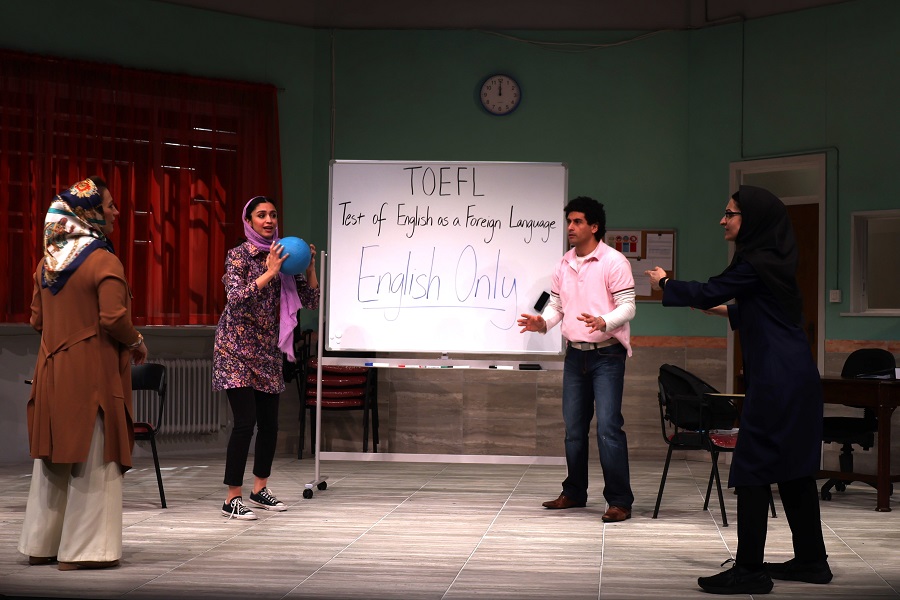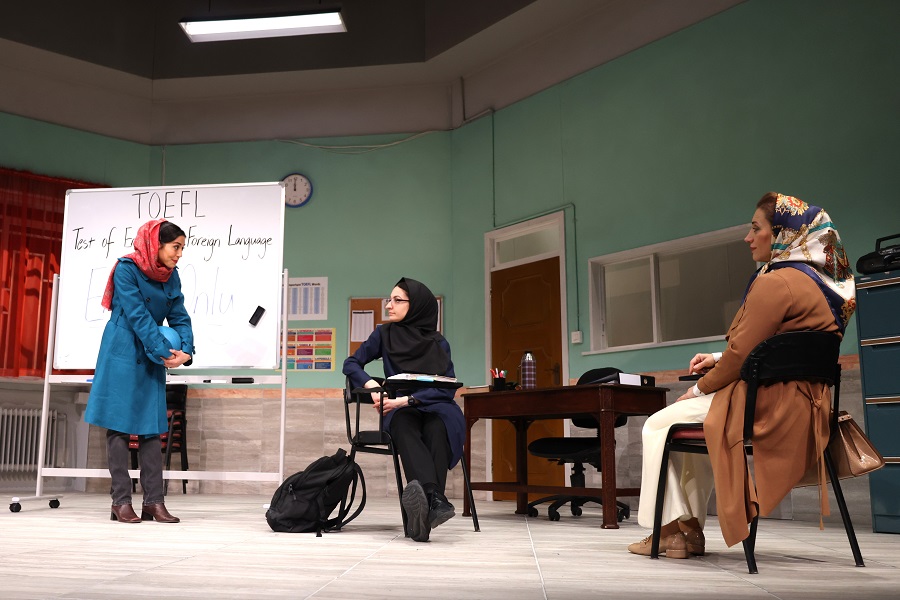
English, Melbourne Theatre Company. At The Playhouse, until September 7. Reviewed by HELEN MUSA.
Canberra audiences usually vote with their feet and the opening of English, by Iranian-American playwright Sanaz Toosi was a case in point as the near-capacity audience showed.
Directed for the Melbourne Theatre Company by former Canberran Tasnim Hossain, one of the proudest products of Canberra Youth Theatre, this palatable, witty play about language itself clearly proved close to the hearts of thinking Canberrans.
It is not a play about Iranian politics.
In a classroom in Iran, repatriated academic and mother, Marjan (Salme Geransar) is teaching English as a second language to a group of adults.

The playwright balances the characters, so that the grandmother Roya (Marjan Mesbahi), who joins the classes for poignant family reasons, simply refuses to adopt western names, even in a teaching game.
Seemingly scatty 18-year-old Goli (Delaram Ahmadi) catches on to English pretty fast, much faster than anybody and would-be doctor Elham (Maia Abbas) prickly and aggressive, outdoes them all in marks, while never quite losing her accent.
As the outsider, in both gender and background, is Omid, played by Osamah Sami. The fact that his grasp of English is mysteriously superior to all the others including the tutor’s, is the source of friction.
At one level, English is a fun play. The attractive, animated Marjan uses various exercises – like throwing a ball around as you throw words to your classmates – to evoke the sense of being in a language classroom.
Marjan is dedicated to the principle of having classes conducted wherever possible in English, not Farsi, but this often breaks down.
Here the playwright has adopted a clever theatrical convention, albeit one which takes the audience a bit of a while to get used to, so that whenever people are speaking Farsi they speak with ordinary Australian accents, but when they switch to English the accents (coached by Ana Bayat) are heavy.
There are many layers to this play for anyone who loves language. The sense of loss when transitioning from your mother tongue to an acquired language is seen through Marjan, who has spent nine years in Manchester and doesn’t quite know where she is linguistically.
Another recurrent theme is how you become a different character when you’re speaking your own mother tongue.
The characters tend to think of English as unpoetic and noisy, and at one moment spontaneous applause erupted in the house when one of the characters imagines how it would be if Farsi, not English, were the international language.
Director Hossain does not approach any of this in a sentimental way although she uses music by musician Hamed Sadeghi to evoke culture and location.
Hossain has her actors moving fast around the stage, often intertwining and criss-crossing in Toosi’s rapid-fire series of episodes leading towards a quiet conclusion.
This was, in short, highly entertaining theatre, but it posed serious questions to those of us brought up in a monolingual country.
Who can be trusted?
In a world of spin and confusion, there’s never been a more important time to support independent journalism in Canberra.
If you trust our work online and want to enforce the power of independent voices, I invite you to make a small contribution.
Every dollar of support is invested back into our journalism to help keep citynews.com.au strong and free.
Thank you,
Ian Meikle, editor



![For graphic designer Tracy Hall, street art is like any artwork, her canvas has been swapped out for fences and plywood, her medium changing from watercolours to spray paint.
A Canberra resident for 13 years, Tracy has been a street and mural artist for the past five.
Her first exploration into grand-scale painting was at the Point Hut toilets in Banks five years ago. “They had just finished doing up the playground area for all the little kids and the words [of graffiti] that were coming up weren’t family friendly,” she says.
“So I ended up drawing this design and I got approval for the artwork.”
Many of Tracy’s time-consuming artworks are free, with thousands of her own dollars put into paint.
@traceofcolourdesigns
To read all about Tracy's fabulous street art, visit our website at citynews.com.au or tap the link in our bio! 🎨🖌
#canberranews #citynews #localstories #canberrastories #Citynews #localnews #canberra #incrediblewomen #journalism #canberracitynews #storiesthatmatter #canberralocals #artist #streetart #streetartist #StreetArtMagic](https://scontent.cdninstagram.com/v/t39.30808-6/490887207_1225841146218103_6160376948971514278_n.jpg?stp=dst-jpg_e35_tt6&_nc_cat=106&ccb=1-7&_nc_sid=18de74&_nc_ohc=MUiEmedc4VAQ7kNvwHTUMX_&_nc_oc=Adk-5HjcsfQwB-n_l8zetmr0YqMaupGjrl2gNVCZdsmkxwn-oqjBg_V7pLtGggCE43s&_nc_zt=23&_nc_ht=scontent.cdninstagram.com&edm=ANo9K5cEAAAA&_nc_gid=qRPX3lp45L9Hh2eo6h7oVw&oh=00_AfEI3UYAlAChERycdrbJ2K621gNM9R9jDSFf1v-C7KY_qQ&oe=68084054)




Leave a Reply